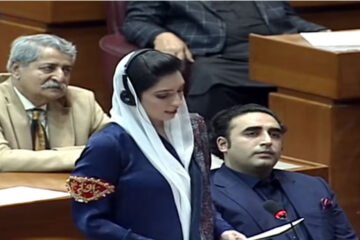India probes Syed Ali Geelani’s family under repressive terror law

Sept 6, 2021: According to officials, police in Indian-administered Kashmir have opened a case against the family of the late resistance leader Syed Ali Shah Geelani under a strict anti-terrorism law for chanting anti-India slogans and wrapping his body in the Pakistani flag.
Geelani, who died on Wednesday at the age of 91, was a symbol of Kashmir’s opposition to New Delhi and had been under house arrest for years. They opened the case on Sunday, officials said.
Geelani’s son Naseem told Al Jazeera that Indian authorities buried Gilani’s body in a local cemetery without any family members when police snatched his body from the house. Police denied this and called it “baseless rumors” by “some vested interests”.
A video widely shared on social media shows Geelani’s relatives, mostly women, trying to prevent armed police from entering the room where his body was wrapped in a Pakistani flag. The video showed the women screaming and protesting as police locked the body in a room with their family and relatives.
Police said they filed a case against the unidentified family members and some others on Saturday and began investigating the case under the Unlawful Activities (Prevention) Act or UAPA.
In India, the booking of a case by the police does not have to be a formal charge but it is an incident that is officially recorded. Critics say the ambiguous UAPA legislation has been used to intimidate or silence dissenting voices across the country, calling the law strict.
The anti-terrorism law was amended in 2019 to allow the government to declare an individual a terrorist. Police can detain a person for six months without any evidence and later the accused can be sentenced to seven years in prison.
Geelani’s son Naseem said Sunday that a police officer met with the family on Saturday and told them a case had been registered against them by the Indian authorities.
“In the midst of the chaos, we didn’t really know what was going on. We were mourning,” Naseem said.
Geelani led the movement for the right to self-determination in Indian-administered Kashmir and was a staunch supporter of the merging of India’s only Muslim-majority region to Pakistan.
For many in Kashmir and beyond, it was a constant sign of resistance against Indian repression.
In a tweet on Sunday, Pakistani Prime Minister Imran Khan, lambasted India’s move and called the removal and hasty burial of Geelani’s body, as well as the case against the family, “shameful”.
“The snatching of the body of 92-year-old Syed Ali Gilani, a highly respected and principled Kashmiri leader (sic), and then the registration of cases against his family is another shameful example of India’s arrival in fascism under the Nazi-inspired RSS, BJP government, ”Khan posted, citing India’s ruling Bharatiya Janata Party (BJP) and its far-right ideological patron, the Rashtriya Swayamsevak Singh (RSS).
While India claims the dispute in Kashmir is because of Islamabad’s proxy war and state-sponsored terrorism, most Muslim Kashmiris see it as a legitimate struggle for independence and support the rebel goal of whether the area is ruled by Pakistan or as an independent country.
The rebels have been fighting against Indian rule since 1989. The region is one of the most militarized in the world. Thousands of civilians, insurgents and government forces have been killed in the fighting.
Tensions in the region escalated after India snatched Kashmir’s semi-sovereignty, stripped it of its statehood and removed inheritance reservations over land and jobs through a set of draconian laws in 2019, and the region is under a state of curfew since then.
India’s authorities have since introduced a number of new laws, which critics and many Kashmiris fear could change the region’s population.
The lock down imposed by India to suppress solidarity gatherings since the death of Syed Ali Geelani continues from last week as most shops and businesses remained closed as government forces patrolled the city’s streets and alleys. Mobile phones were restored late Friday night, but mobile internet and public gatherings continue to be banned in many parts of the Kashmir Valley.
India’s paramilitary troops were stationed outside the cemetery where Geelani was buried.
Geelani’s granddaughter Ruwa Shah wrote on Twitter that she was scared of “what happened after the death of our old man”. “His home was a prison for more than a decade and now his cemetery is a prison,” she wrote.
Death is inevitable, but what followed after our old man passed away, has been horrifying.
Aba’s home was a jail for over a decade and now his graveyard is a jail too. #SyedAliShahGeelani
— Ruwa Shah (@ShahRuwa) September 4, 2021
Stay tuned to BaaghiTV for latest news and Updates!










